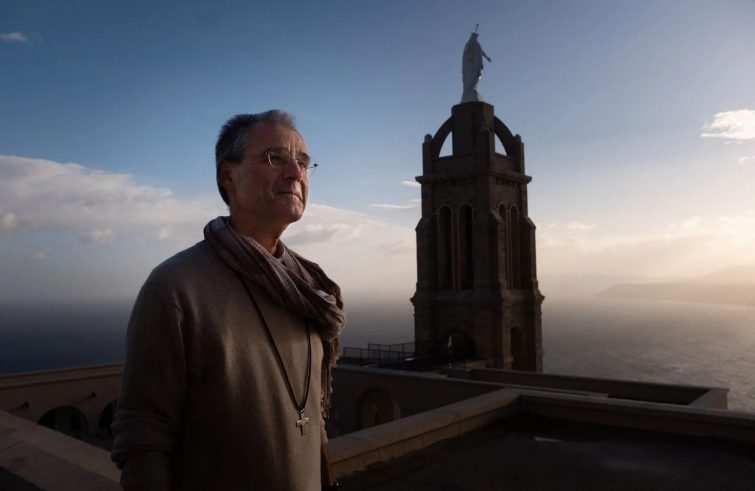
“Ours is a fraternal Church. That is the image we project, which corresponds to the truth and is an important part of our witness, even though we often perceive the fabric inside out, with its knots and threads that seem to wander in all directions.” Jean-Paul Vesco, the new Archbishop of Algiers, used these image to describe the Catholic Church in Algeria. The archbishop will be representing Algeria at the Florence meeting of bishops and mayors of the Mediterranean region. Statistics show that there are about 5,000 Catholics living in Algeria, equivalent to less than 0.01% of the population, the vast majority of whom are Muslim. “We live out human fraternity in our parish congregations, with our migrant brothers and sisters, especially when we visit them in prison,” added Msgr. Vesco. “We put it into practice with the inhabitants of this country. It is the special vocation of our Church. As Christians and as a Church, with men and women of the Muslim faith. This fraternal relationship transcends religious prejudices and the scars of historical events.” In his pastoral letter, the archbishop writes: “Our Church is constantly called into question, and in turn she asks herself why she is here, in a country with almost no Christians.”
Your Excellency, what answer have you given to this question?
We believe that what the Pope has written in the Encyclical Fratelli Tutti, as reiterated in the Abu Dhabi Document of 2019, and indeed the Pope’s many gestures of fraternity in recent years, reveal the meaning and purpose of our presence here. Fraternity is an evangelical value and a powerful witness. Our life is our proclamation. While not hiding who we are and our beliefs, we are aware that we are speaking to people whose faith is different from our own. We are believers among believers. This is a fundamental aspect of our presence.
We may talk, but dialogue is not about one truth versus another. Fraternity is not about understanding who is wrong and who is right, but about discovering together how each one of us, through our respective faiths, can become true brothers and sisters.
What are the fruits of this dialogue based on fraternity?
Rather than observing the fruits, we have the impression that we have sown and occasionally reaped little. The fruits are noticeable especially in interpersonal relationships, in the friendships that are created. Admittedly, our societies continue resisting these dynamics of fraternity. Fears are there, and they are hard to overcome, but we must not lose sight of the progress made all around us. As an example, in 2018 we celebrated at the Shrine of Notre-Dame de Santa Cruz in Oran the beatification of Bishop Pierre Claverie and 18 other martyrs, killed in Algeria between 1994 and 1996, victims of the violence that had broken out in the country at that time. A public Mass was celebrated in a Muslim society for the first time.
We are aware that changes take time and that Islamic-Christian relations are complex, but small steps are being taken and each step forward shows that the journey ahead continues nonetheless.
What do you expect as Christians in Algeria?
My greatest hope is that religious differences will no longer play such a structural role in the life of a society, that they may be experienced with respect and full acceptance of others, including the diversity of religious beliefs.
We, as a Church and as Christians, are still regarded as strangers. We would like to be recognised as human beings, brothers and sisters of this population, citizens of this country.
Recognising our citizenship is not a political statement for us. Rather, it stems from the conviction that a society is strong when it accepts and is open to otherness. This is true for all societies in the world, since we are seeing a widespread fear of otherness and the temptation to close oneself off and withdraw.
The Florence meeting will be attended by bishops and mayors from cities located in the Mediterranean region. What do you envision for this meeting?
Our Church extends from the Mediterranean coast to the Sahara desert. Seen from our perspective, the Mediterranean Sea is not a border. In historical, cultural and geographical terms, but also with respect to fauna and flora, the peoples bordering this Sea share many things. We share the same climate and often the same traditions, and those common traits are the foundations underpinning our Christian and Muslim faiths today.
We have created the boundaries separating our religious differences, separating Western society and the Arab Muslim world, and separating North and South.
The Pope has often denounced the fact that the Mediterranean Sea has become Europe’s largest open-air cemetery. What is the legacy of those deaths?
In Santa Cruz di Orano, where the Beatification Mass of the 19 martyrs was celebrated, the Marian shrine overlooks the sea. A Memorial is being built there in memory of all who died at sea. The inscription will recite: “In memory of those who died at sea with no burial but not without hope”. Their legacy, and the legacy of the martyrs in Algeria, are a testimony that life is stronger than death and that fraternity will prevail.
There is no other choice. There is no other option. As Pope Francis says, fraternity is the new frontier of humanity. We must discover each other as brothers and sisters, respecting each other’s differences. The only alternative to human fraternity is destruction.









